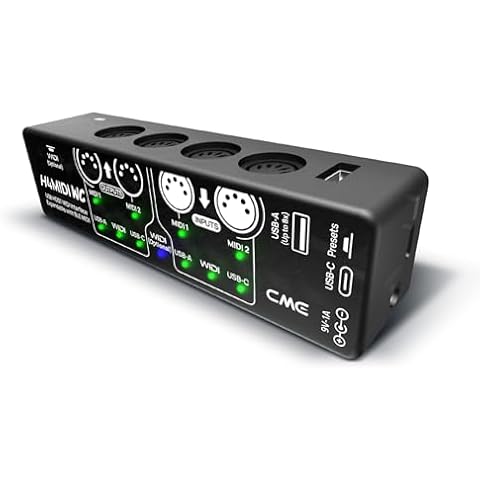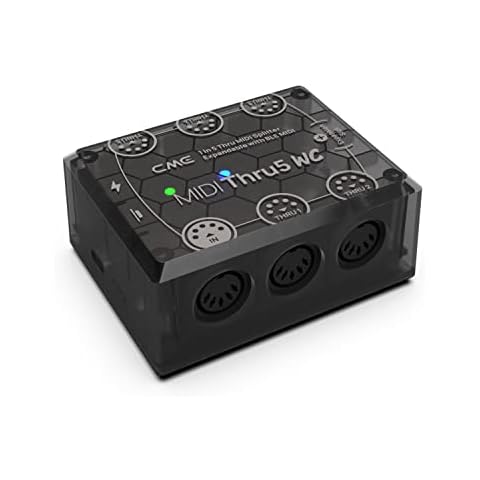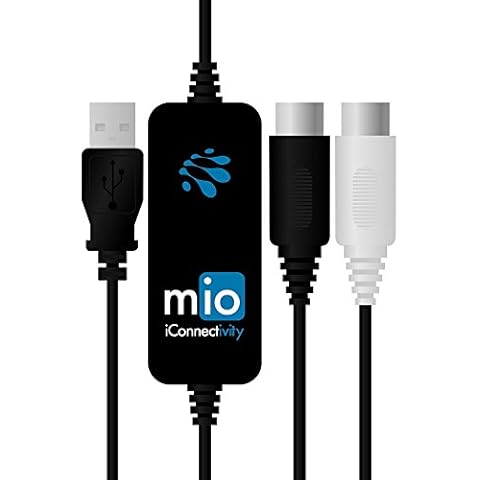Best MIDI Interfaces of 2025
* We independently evaluate all recommended products and services. If you click on links we provide, we may receive compensation.
MIDI interfaces are electronic devices that allow musicians, producers and DJs to connect their MIDI-enabled instruments and equipment to computers, tablets, and other digital devices. These interfaces typically come in the form of a small box or cable that acts as a bridge between the analogue and digital worlds, translating MIDI data into a format that can be understood by computers and other digital devices. With a MIDI interface, users can record, edit and manipulate MIDI data, as well as control software instruments and effects. MIDI interfaces are an essential tool for anyone looking to integrate their analogue and digital music-making workflows.
At a Glance: Our Top Picks
Top 10 MIDI Interfaces
Roland UM-ONE Mk2 USB MIDI Interface
The Roland UM-ONE Mk2 is an excellent way for you to connect your MIDI controller to your PC, Mac, or iPad, making music on your computer a breeze. With its compact and convenient design, this interface offers high-performance FPT processing for low latency and tight timing, ensuring that your music creation is smooth and efficient. The bus-powered feature means you won't need extra power supplies, and its compatibility with both Macs and PCs, as well as iPads via the Apple iPad Camera Connection Kit, provides great versatility for your music setup.
ESI MIDIMATE eX USB MIDI Interface Cable
The ESI MIDIMATE eX is a versatile USB MIDI interface cable featuring two independent MIDI connectors that can function as either inputs or outputs. This flexibility allows you to connect various MIDI devices seamlessly, enhancing your music production capabilities. Its high-speed connection is optimised for both USB 3.0 and 2.0 ports on PCs and Macs, ensuring reliable performance. Additionally, being bus powered means you won't need to fuss with an external power supply, making setup and use incredibly straightforward.
CME U6MIDI Pro - Versatile MIDI Interface with Router
The CME U6MIDI Pro is a plug-and-play MIDI interface designed for seamless connectivity with your computer. With its single USB-C port, you can easily connect to various operating systems, ensuring versatility across devices. As a standalone 3-in-3-out MIDI interface, it offers advanced routing and filtering capabilities, allowing you to configure MIDI messages to suit your needs. Experience minimal latency and no jitter, ensuring that your performance is precise and synchronised, whether you're using a digital piano, keyboard, or synthesiser.
CME WIDI Thru6 BT - Bluetooth MIDI Hub
The CME WIDI Thru6 BT offers a seamless way to connect all your MIDI devices. Its hybrid feature allows you to easily link standard MIDI connectors and wirelessly connect to Bluetooth MIDI controllers across various platforms. Enjoy accurate performance without data errors, ensuring flawless communication between devices. With its versatility, you can combine wired and wireless connections from a single unit, accommodating up to 10 MIDI devices at once, which greatly enhances your setup.
CME H4MIDI WC - Versatile USB MIDI Interface
The CME H4MIDI WC is a powerful USB MIDI interface that allows you to connect multiple USB MIDI instruments directly to your hardware without needing a computer. You can connect up to eight devices effortlessly through a standard USB hub. It also offers multi-mode flexibility, enabling you to connect to various operating systems via USB-C with four virtual MIDI inputs and outputs. For guitarists, its dual power options ensure reliable performance, whether in the studio or on stage, providing convenience in any setting.
CME MIDI Thru5 WC 1-in-5-out Interface
The CME MIDI Thru5 WC offers exceptional performance for your MIDI setup, whether in the studio or on stage. With its future-proof technology, you can effortlessly connect multiple MIDI devices using standard MIDI connectors. You’ll appreciate the accurate data transmission, ensuring no errors or signal dropouts during your performances. The compact design makes it easy to place out of sight, perfect for tight spaces or pedalboards. Additionally, you can enjoy professional-grade performance with minimal latency, supporting all MIDI channels and messages.
Nektar MIDIFLEX 4 USB MIDI Interface
The Nektar MIDIFLEX 4 is a versatile 4-port MIDI interface that connects seamlessly via USB. You can configure it as 1-in/3-out, 2-in/2-out, or 4-out, giving you flexibility for various setups. Automatic port detection with LED indicators helps you easily identify active connections, enhancing your workflow. Additionally, in stand-alone mode, it allows for MIDI-split or merge functions, making it convenient for live performances or studio sessions.
Arturia MiniFuse 2 USB Audio Interface
The Arturia MiniFuse 2 is a versatile USB audio interface designed for musicians and content creators alike. With its compact design, you can record vocals, guitars, and synths from anywhere, making it perfect for both home studios and outdoor sessions. Enjoy high-quality sound with easy-to-use features, ensuring your recordings are sharp and professional. The Loopback feature allows you to capture voiceovers alongside in-app audio effortlessly, enhancing your production capabilities. Plus, connecting your instruments and MIDI gear is a breeze with its array of ports.
iConnectivity mioXL MIDI Interface with 8x12 Ports
The iConnectivity mioXL Interface features 8 in x 12 out 5-pin DIN-MIDI ports, allowing you to connect multiple MIDI devices seamlessly. Its USB computer port supports Mac, Windows, and iOS, giving you flexibility in your setup. With Plug and Play functionality, you won’t need to worry about installing drivers. The OLED display and rotary encoder make it easy for you to navigate presets and monitor MIDI traffic in real-time, enhancing your control over your MIDI environment.
iConnectivity midi mio USB to MIDI Interface
The iConnectivity midi mio offers seamless connectivity for both Mac and PC users with its native compatibility across various operating systems. Its plug-and-play feature allows you to set it up effortlessly, eliminating the need for complicated installations or drivers. With ultra-low latency for both MIDI input and output, you'll experience near-instantaneous responsiveness, enhancing your music production. Additionally, the 5-foot long USB to MIDI DIN cable provides flexibility in setup, while being USB bus powered means you won't need an external power supply.
Frequently Asked Questions (FAQs)
1. What is MIDI interface used for?
MIDI is an acronym that stands for Musical Instrument Digital Interface. It's a way to connect devices that make and control sound — such as synthesizers, samplers, and computers — so that they can communicate with each other, using MIDI messages.
2. Do I need a USB MIDI interface?
Do You Need a MIDI Interface? Most USB-equipped keyboards, digital pianos, and controllers come with a MIDI interface built-in, so if you plan on a simple setup and aren't using legacy gear, you probably don't need a dedicated MIDI interface.
3. What are the three types of MIDI?
The MIDI specification defines the electrical characteristics of the MIDI interface and the communications protocol used. To the user the physical interface appears as 3 different types of MIDI ports: MIDI In; MIDI Out; and MIDI Thru.
4. Do I need MIDI on audio interface?
If you don't own or wish to use an audio interface, or your audio interface does not include MIDI, then you will need a standalone MIDI interface. This one from Amazon will be perfect – the FORE MIDI to USB interface (affiliate link).
During our midi interface research, we found 46 midi interface products and shortlisted 10 quality products. We collected and analyzed 28,584 customer reviews through our big data system to write the midi interfaces list. We found that most customers choose midi interfaces with an average price of £51.69.
The midi interfaces are available for purchase. We have researched hundreds of brands and picked the top brands of midi interfaces, including ROLAND, ESI, CME, Nektar, Arturia.
Hayden was born in Liverpool, and he never left his hometown until university. In his freshman year at the University of Manchester, Hayden was the group leader of a popular music group. Hayden is responsible for the popularity of his music, and this is because of his natural ability to play with keys and strings. He graduated with BFA in 2016 and returned in 2018 as a lecturing staff in the School of Music.









